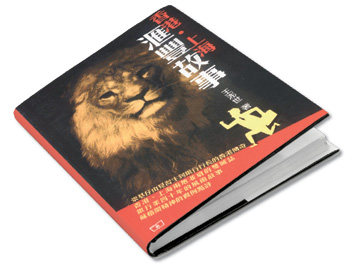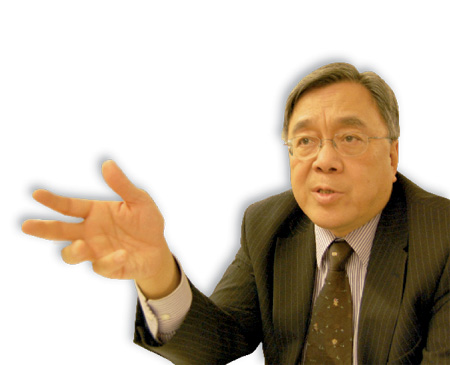Man of letters
Updated: 2010-12-07 07:24
By Fu Lei(HK Edition)
|
|||||||
|
Retired banker Eddie Wang published two books this year, telling his experience of directing companies on the mainland and recounting his long career with the HSBC. Fu Lei / China Daily |

Having retired from a successful career as a top banker, Eddie Wang began a new career as a writer. Now with two books to his credit, Wang has decided to become a reporter. Fu Lei reports.
Eddie Wang was the second most highly-paid chief executive officer of all listed companies in China last year. He's not interested in getting to the top of the list this year. He wants to be a reporter.
"I plan to start something in the media. No matter whether it is television, radio, newspaper or magazine, I would like to have a try," he said.
"Being a reporter you have a rare chance to compel others to respond by raising questions they cannot dodge. Nowadays many reporters don't have in-depth observations."
Wang having hit upon a post-retirement career has already taken up writing - publishing two books this year, recounting inside stories of his days as a banker at the Hongkong and Shanghai Banking Corporation (HSBC) and the China Minsheng Bank. He retired from the Minsheng Bank in July 2009, when his three-year term expired.
"My value for the bank began to diminish after I reached a peak sometime during the three years. I am not Andy Lau or Jacky Chan who retains unchanging charm. My maximum value at present is to write books," said Wang, 61, a Shanghai-born Hongkonger.
Wang's readiness to attempt different undertakings may have been fostered during his 32-year HSBC career. He shifted among a dozen businesses and programs. He redesigned forms and lists and planned the office layout for the bank's landmark headquarters.
He retired from the HSBC in 2004, took up cross-border commerce for a year, then became the first Hong Kong banker to head a mainland bank. His before-tax salary at Minsheng was about 10 million yuan.
Writing is his third endeavor after leaving the HSBC.

His first effort, published early this year, is a 210-page Chinese-language book introducing Hong Kong readers his experience of directing companies on the mainland.
"My mainland experiences were quite superficial before I entered the Minsheng Bank. When I was in charge of the HSBC's business on the mainland, I was more like a tourist there," Wang said.
He became the HSBC's front man, spearheading the effort to revive the bank's nearly extinct mainland business through the mid-1990s and early 2000s.
"To observe the Chinese market from a foreign company is one thing; to become a player in the market is another. The latter is more vivid and, for me, unprecedented," he said.
The book titled The Art of Management on the Mainland expatiates on the binge-drinking culture among Chinese officials and businessmen, to the newspeak full of subtleties that may escape many Hong Kong and foreign listeners.
The book quickly became a bestseller as Wang touched on a subtle mindset of mainlanders that sometimes gives rise to tensions among people from opposite sides of the border.
"After all, China is a country that just began to develop. It needs to learn in many aspects. However, it does not require an arrogant attitude. Chinese are eager to know but they won't accept if you tell them they know noting at all."
While Wang advocates an adaptive manner of living and working on the mainland, he made no attempt to conceal the problems of the banking industry.
Mainland banks maintain interest rates of 4 percent, often double the rates of banks in other places. That has led to a heavy emphasis on expansion regardless of the cost, Wang concludes in one chapter of his book.
"Why can't we cut the cost down? Indeed we all know why. If we do, can we still drink 15-year-old Moutai? Not to mention the 50-year-old one," Wang said, referring to the premium Chinese liquor that bankers use to entertain their customers, who in many cases, are officials of local governments.
Wang's outspoken style and his succinct way of writing drew further interest from the publisher. His second book, about the same length as the first, came out just months later.
"I didn't have any assistant. I did everything on my own," Wang said. He does not write every day, but every time he writes, he shuts himself off for two or three hours.
"I seize the hours to write and look for information when there is no meeting bothering me. I seldom rest," he said. He gets up at five o'clock every morning.
Wang's second work is more of an autobiography recounting his long career with the HSBC, Hong Kong's flagship bank. "I recount my story against the backdrop of Hong Kong. The HSBC is like a family of which I was a member. Of course, there is a patriarch in the family," he said.
The book tracks the bank over the last three decades of the 20th century, through the stock market crash, the rise of local corporations and the Asian financial crisis. The book exudes feelings of nostalgia for the bank's tough culture and assertive leaders of the bygone era.
"The present executives don't have as profound experiences with the HSBC as the elder generation did. Their understandings of the corporate culture are inevitably several removes from those of their predecessors," Wang said.
Now the biggest bank in Europe, the HSBC had a big management shakeup in September. Chief Executive Michael Geoghegan announced he was stepping down in December, reportedly because he had failed to secure chairmanship of the HSBC.
Douglas Flint, the group's financial director who is expected to ascend to the position has worked for the HSBC for only 15 years. All previous CEOs had been with the bank for at least thirty years before moving into the top job.
Besides writing books, Wang shares his knowledge by giving lectures to bankers in second-tier Chinese cities, where he is respected for his guidance helping banks to "go outside".
He gave a six-hour lecture at a bank in Shijiazhuang in North China in November after a grueling journey in a car filled with cigarette smoke.
"I didn't charge them. As long as you wish to hear, I am willing to share. Though I did not have time to prepare a 150-page slide as they requested, I did a 50-page one. 'In good faith,' that's what I learned from the HSBC," Wang said.
He is a frequent flyer between Beijing, where he lives, Hong Kong, where his family is located, and Shanghai, in his words, "his transfer station".
Wang plans three more books. He has almost finished one. The epilogue remains unfinished. He hopes to update it before the book goes to print.
"It is somewhat like an English edition of my first book, in which I would like explain to foreign readers the reason behind every seemingly unreasonable mainland phenomenon, starting from the concept of 'consensus' which mainlanders firmly pursue everywhere," said Wang.
"But I find it very difficult to translate the Chinese-style newspeak."
(HK Edition 12/07/2010 page4)
